
by Erin Long | Jul 19, 2019 | Hidden from Archive
Grain dust is one of the biggest combustible dust hazards in the industry. OSHA doesn’t have a combustible dust rule for general industry, but they do have one for agriculture and food processing (1910.272) because of the high risk and number of accidents. The NFPA also has a special standard for this industry (Standard 61) to try to reduce the number of combustible grain dust explosion accidents.
Grain dust explosions increased in 2018 over previous years, with twelve explosions compared to seven the year before, according to Purdue University’s Department of Agricultural and Biological Engineering. However, injuries and fatalities decreased from five deaths and twelve injuries to one death and four injuries.
This statistic only considers reported grain dust explosion incidents, and explosions without injuries may not be reported. There are also many grain dust fires that are not reported but still cause significant property damage. Some companies with a reported explosion that caused injuries had a history of multiple smaller fires and explosions that weren’t reported.
In most of the reported incidents, the ignition source was unknown. This was usually because the area where the explosion occurred was too damaged to track down possible ignition sources. Known ignition sources included sparks from machinery and overheated bearings. The number of possible ignition sources is almost unlimited because grain dust is so easy to ignite.
OSHA has reported that since they started enforcing their standard in 1987, the number of explosions has decreased significantly. Prior to those regulations, grain dust fires and explosions were often considered to be an inevitable cost of handling and storing grain. With process hazard analysis now required, problems are more likely to be identified before there’s an accident.
Still, grain dust explosion accidents continue to happen. Often, the hazard has been identified but not addressed. An example would be allowing grain dust to accumulate around the facility. Often, the thought is that it’s never been a problem before. It may not be a problem until the dust is stirred up and the cloud finds an ignition source. The danger here is that the first cloud of stirred-up dust might be small and only cause a quick flash fire, but the force of this could disturb and ignite much larger amounts of dust. This is called a secondary explosion, and it is usually bigger and more destructive than the first one.
Major sources of accumulated grain dust are pieces of grain handling equipment, such as bucket elevators, conveyors, mixers, and grinders. Since grain is being moved around in these processes, a lot of dust often escapes unless there is a dust collection system there to capture and remove it.
Baghouses are popular for dust collection in the grain industry, but cartridge collectors can also be used. They are especially useful as spot collectors because they are small and can be located over a particular spot where dust is being produced. Baghouses are usually large because they need lots of bags to provide enough surface area for good filtration. A cartridge collector can be much smaller because the pleated cartridges have a much higher surface area than bags.
A dust hazard analysis will identify places such as grain elevators where dust is likely to be a problem. Before planning and installing dust collection or dust control measures, all the hazards should be identified. This includes any areas where a breakdown in normal processes could cause dust to build up or potential ignition sources that could develop, such as overheating machine parts. A dust hazard analysis is required by NFPA 652, the most recent combustible dust handling standard. NFPA 652 is not meant to replace NFPA 61 or other industry-specific standards, but anything in NFPA 652 that isn’t addressed in the industry standard still applies.
Deaths from grain dust explosions may have decreased, but they continue to occur. This happens even though the grain and agriculture industry has been one of the earliest officially regulated combustible dust hazards. Dust collection is an essential part of grain dust control and should be in use anywhere that dust can build up during the process.
Read more
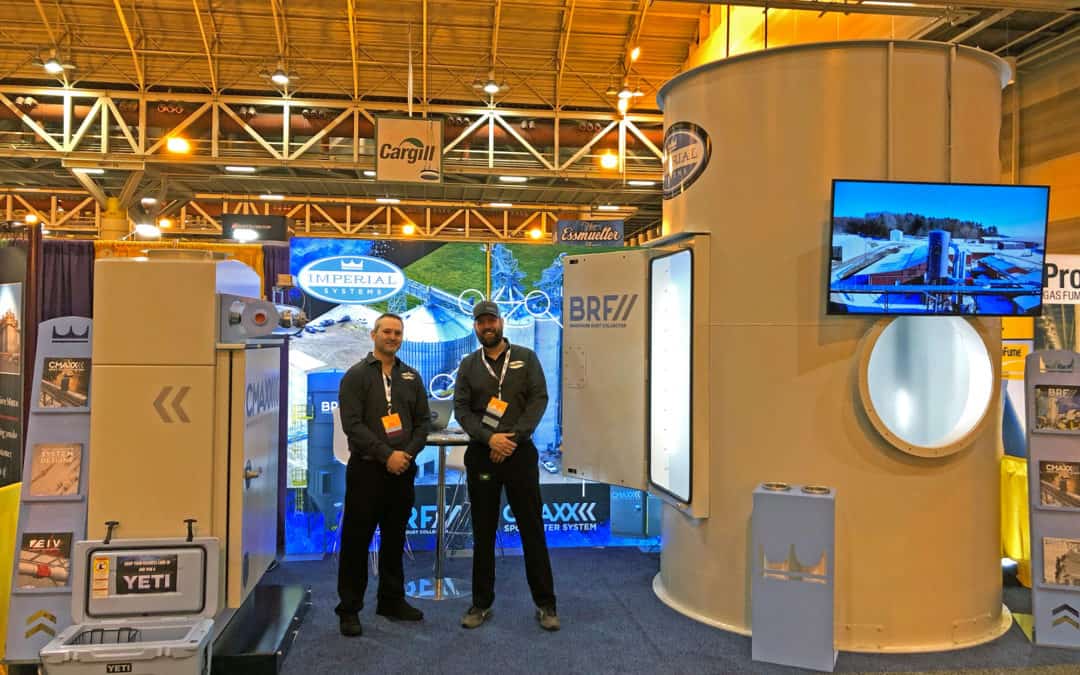
by Erin Long | Jul 19, 2019 | Hidden from Archive
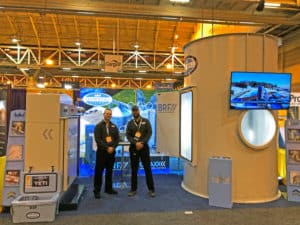 GEAPS (Grain Elevator and Processing Society) 2019 in New Orleans featured some of the largest Grain and Seed processing equipment companies. This year at GEAPS was the first year that we decided to bring some rather large equipment. We really wanted to show up and show off some of our new technology. Our booth featured our new BRF Medium Pressure baghouse. We built a 7 foot clean air plenum to demo the new cleaning system. We also had a CM002 Spot filter on display as well. Both of these items will be on display at our showroom.
GEAPS (Grain Elevator and Processing Society) 2019 in New Orleans featured some of the largest Grain and Seed processing equipment companies. This year at GEAPS was the first year that we decided to bring some rather large equipment. We really wanted to show up and show off some of our new technology. Our booth featured our new BRF Medium Pressure baghouse. We built a 7 foot clean air plenum to demo the new cleaning system. We also had a CM002 Spot filter on display as well. Both of these items will be on display at our showroom.
The show had a little bit of everything to offer, from dump pits to rail cars to storage bins and engineering firms. Each company could have the need for dust collection in their facility as well as the grain companies that attended.
The show went well, and although not as big as Fabtech the show still pulled in the big names in the world of grain, seed, and food. During the show we would demonstrate the pulse cleaning system of our BRF-MP. If you have never heard this cleaning system in action, you have to imagine something similar to an air canon or spud gun being fired. This powerful blast is designed to clean off the dust that would build up on the bags. Eventually we had to shut that down due to the sudden blast scaring everyone that wasn’t paying attention. Fortunately, we could still show the moving arm and explain the auto calibrating pulsing system. We also had our CMAXX Spot Filter showing the different applications that would benefit any source capture grain process. Giving customers the opportunity to get hands on with our equipment is really when they see the difference. Our equipment visually has clean lines and looks great, while being able to see how heavy duty it is makes a difference. Not to mention the simplicity of the CMAXX filter changeout. You can really see people’s faces light up when they realize how much thought and care we put into our products.
New Orleans weather was a nice reprieve from the cold rain of western Pennsylvania. The city was colorful and we got to experience a little bit of the culture. We went to the French Quarter and got beignets and coffee and watched the street performers. We also had some of the local creole cuisine which was excellent. You can still see the aftermath of hurricane Katrina but it is obvious the city is rebuilding and moving forward.
All and all, GEAPS in New Orleans went well. We got to talk to great people from the grain industry as well as getting to see all of the equipment that services this industry. We got some great leads and gave the grain community a chance to see our equipment first hand.
Read more
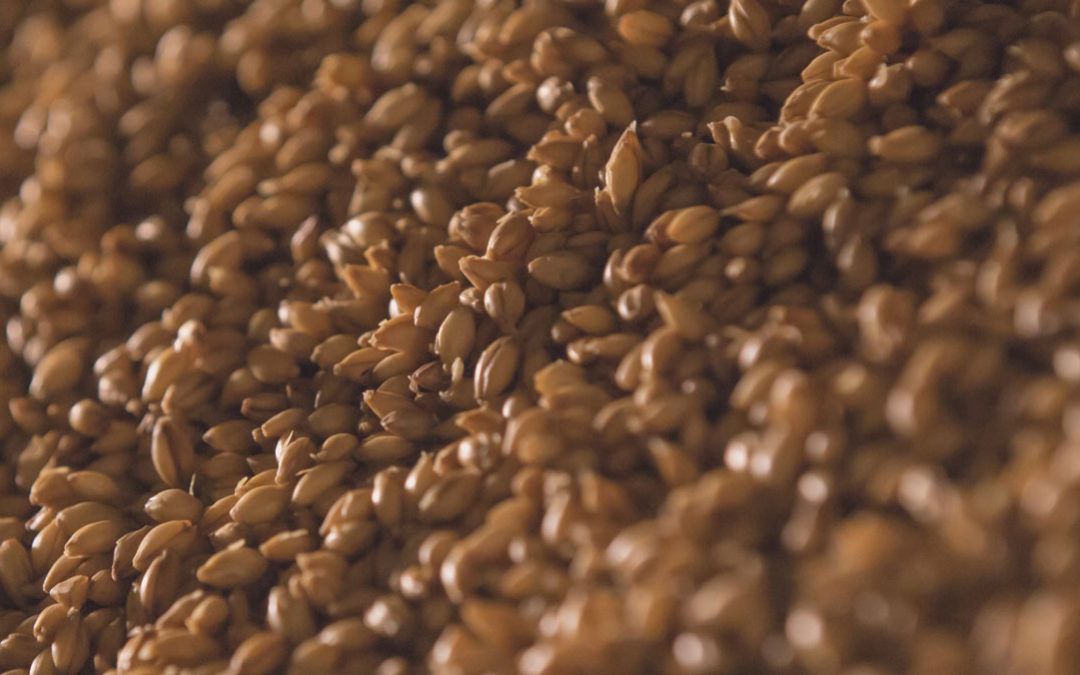
by Erin Long | Jul 17, 2019 | Uncategorized
Hammer mills process grain and other products in agriculture processes. Industrial hammer mill material handling requires dust collection to prevent combustible dust fires. Handling and transporting agriculture process materials are covered under NFPA 61 and OSHA 1910.272. Many other industries use hammer mills, which produce dust that may be combustible.

Hazards in Material Handling Equipment
Grain dust becomes flammable when it is airborne. Places in the process where grain dust becomes airborne include:
- hammer mill crushers
- conveyor belts and transfer points
- bucket elevator conveyors
- mixers
- loading and unloading points
- dryers
- spouts and hoppers
Material handling systems produce dust, and they also produce opportunities for ignition. A hammer mill grinder is one element of the agricultural process that produces large amounts of dust. A bucket elevator is another one, partly because the material moves around. It can also cause ignition because the bearings can overheat.
In addition to hammer mill material handling, dust can accumulate in other grain processes in agriculture. Some agricultural dust can be very combustible. Managing risk means removing elements of the so-called explosion pentagon. This includes oxygen, ignition source, fuel, containment, and dispersion. Oxygen will always be present, and the dust acts as a fuel. In various parts of the process, the material may be inside a closed space (containment). Therefore, the parts of the explosion pentagon that can be controlled are ignition sources and dispersion. This is true for hammer mill material handling and other process areas.
 Controlling ignition sources includes following all electrical safety standards and watching all equipment, like bucket conveyors, for overheating bearings. Removing all ignition sources is almost impossible. However, getting rid of as many as possible reduces the risk.
Controlling ignition sources includes following all electrical safety standards and watching all equipment, like bucket conveyors, for overheating bearings. Removing all ignition sources is almost impossible. However, getting rid of as many as possible reduces the risk.
Keeping dust from becoming airborne (dispersion) keeps a deflagration from starting. Once airborne dust ignites, the flame must not reach other areas. This is especially true for areas that could cause injury to people. Dust collection systems can prevent dispersion and the spread of a deflagration.
Dust Collection for Hammer Mill Material Handling
Depending on the material, hammer mills can produce a large amount of dust. Many other components of material handling systems, like bucket elevators, also produce dust. NFPA and OSHA standards require control of this dust. Dust must not build upon surfaces or become airborne. A well-designed dust collection system will prevent these.
Some agricultural processes will use a central baghouse with capture hoods located at various dust generating spots, including at the discharge of a hammer mill. This technique for hammer mill material handling can be very effective, especially if one central baghouse can handle the capture points.
Spot filters can be a very effective solution for larger facilities, or for ones where a central baghouse might be too far away. Spot filters can be located at many kinds of capture points for material handling equipment. These include bucket elevators, conveyors, mixers, hammer mills, and loading/unloading points. Cartridge collectors, which are small and compact, can be sized to fit at any of these points. Because the pulse cleaning of the filters is very efficient, filters can last a long time.
Many agricultural process facilities use a combination of both types of dust collection, with baghouses or large cartridge collectors in a central area and spot filters on more remote capture points. Both baghouses and cartridge collectors can work well for hammer mill material handling in agriculture. Depending on how fine the material powder is, a spot filter cartridge collector can be the best solution. This will keep fugitive dust from escaping at a capture point.
Learn more about our Grain Dust Collection Systems.
Read more
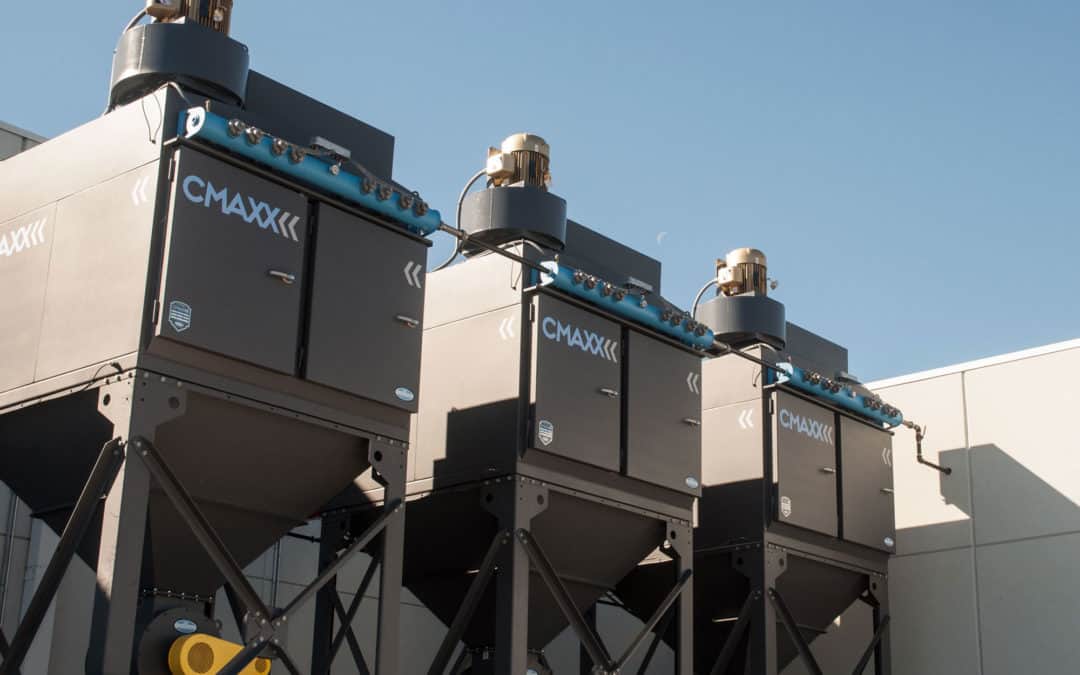
by Erin Long | Jul 10, 2019 | Uncategorized
Wondering if that aging thing behind the building needs a little work? One company put money into a dust collector upgrade. As a result, it ended up saving them from serious property damage and expensive repairs.
The dust explosion index dustsciencesafety.com issued an incident report. It chronicles that a company, which makes specialty automotive parts, suffered a metal dust fire in May 2018. Metal dust fires can be dangerous and explosive. So major damage could have been done to the building and people in it.
Luckily, the company had recently invested in upgrading its dust collection system, which includes several collectors. Thanks to this investment, the fire never escaped the dust collector. Firefighters arriving on the scene noted that because the fire was limited to the dust collector, it was easy to manage. Without the dust collector upgrade, the fire might have spread through the building.
Combustible Dust Hazards
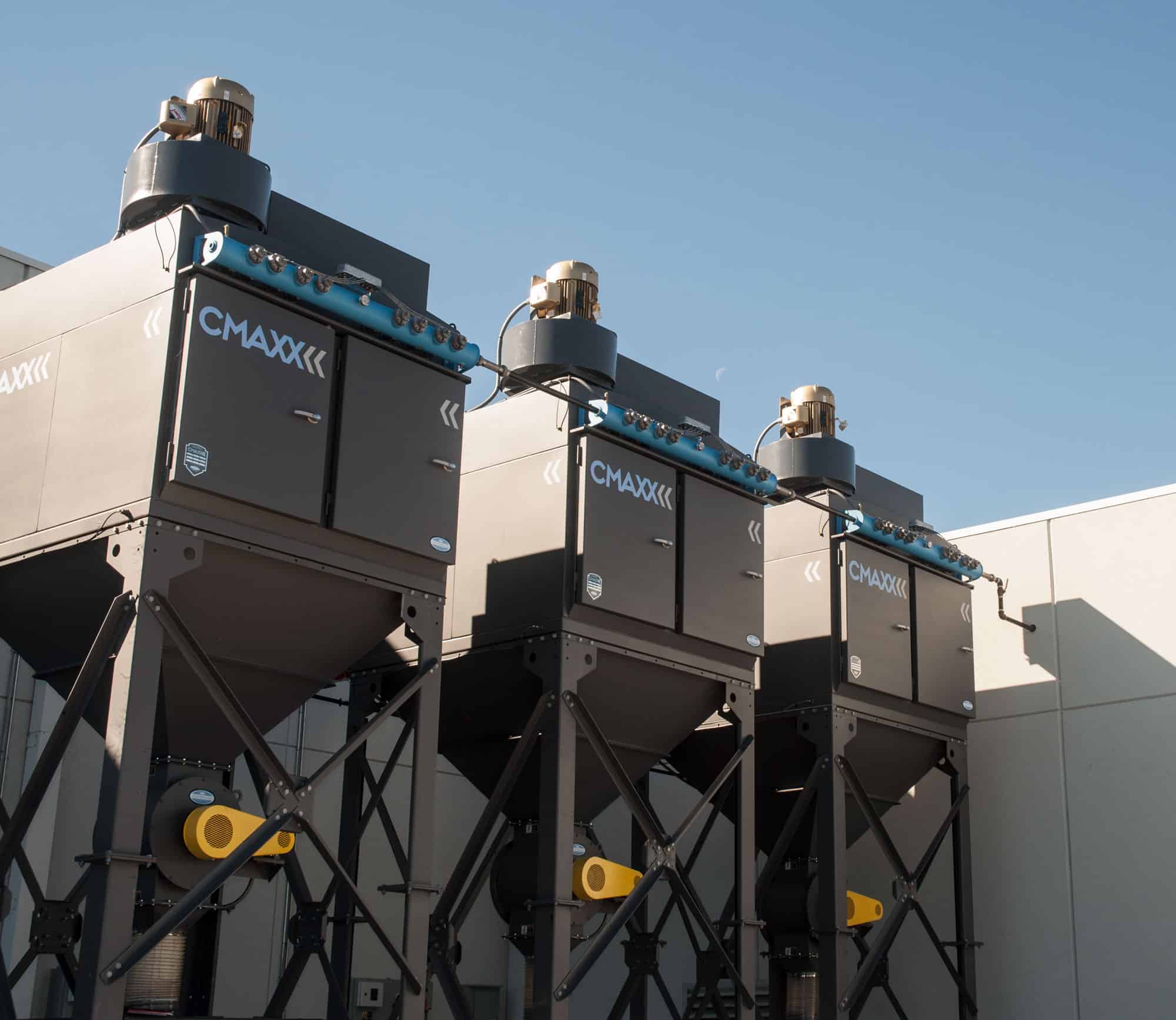 What kind of dust collector upgrade might save your building or employees from serious harm? Some old dust collectors may not have the kind of fire and explosion prevention devices required by NFPA standards on newer equipment. In some cases, it may be a poor system design. In other cases, the company or the system designers may not have known the dust could be combustible.
What kind of dust collector upgrade might save your building or employees from serious harm? Some old dust collectors may not have the kind of fire and explosion prevention devices required by NFPA standards on newer equipment. In some cases, it may be a poor system design. In other cases, the company or the system designers may not have known the dust could be combustible.
NFPA 652 requires that all facilities that handle combustible dust conduct a dust hazard analysis. It must include inspecting for any risk factors and figuring out how to fix them. The dust hazard analysis may reveal that the procedures for controlling combustible dust aren’t good enough. In that case, a dust collector upgrade or other improvements will be needed.
Fire and Explosion Prevention for Dust Collectors
One method of controlling fire or explosion is to prevent sparks or flames from getting into the collector at all. Install a spark arrestor, which is a passive protection device, in the ductwork before the dust collector. It will stop most, but not all, sparks. Another option is an active system with a spark detector. Once a spark or flame is detected, a chemical isolation system or abort gate triggers to isolate or divert it.
Other passive methods of fire and explosion control include explosion isolation valves. An advancing pressure wave will close the valve and isolate the explosion from moving forward. Probably the simplest tool, explosion venting, continues to be effective in releasing pressure from the collector. Also, consider a chemical suppression system inside the dust collector. It will suppress a fire that has reached the collector or started inside it.
If a dust collector is located inside a building, there must be a way to vent an explosion safely. Use a flameless explosion vent if an explosion can’t be vented outdoors. These are expensive and can allow dust to escape, so they shouldn’t be used with highly toxic materials. If there is no choice but to locate a dust collector inside, this may be the only feasible option.
Is a Dust Collector Upgrade Worth the Money?
Newer methods of fire and explosion control such as chemical isolation and suppression are dust collector upgrade options. Inspect old systems for any safety features that aren’t operating properly or don’t meet new standards. For example, a dust collector might not have enough explosion venting to meet current safety standards. Further, the filter media in the collector might be flammable instead of flame retardant material.
For the company mentioned at the beginning of this story, the decision to upgrade was very beneficial. Improving fire and explosion protection of their multiple dust collectors saved them an enormous amount of money. Firefighters noted that safety features kept the fire isolated inside the dust collector where it started. Had the fire spread back through the ductwork, large sections of the building could have been damaged.
Consider adding some new fire protection features, or upgrading an existing dust collector. Either costs much less than repairing fire-damaged buildings. As they often say, if you think safety is expensive, try an accident.
Read more
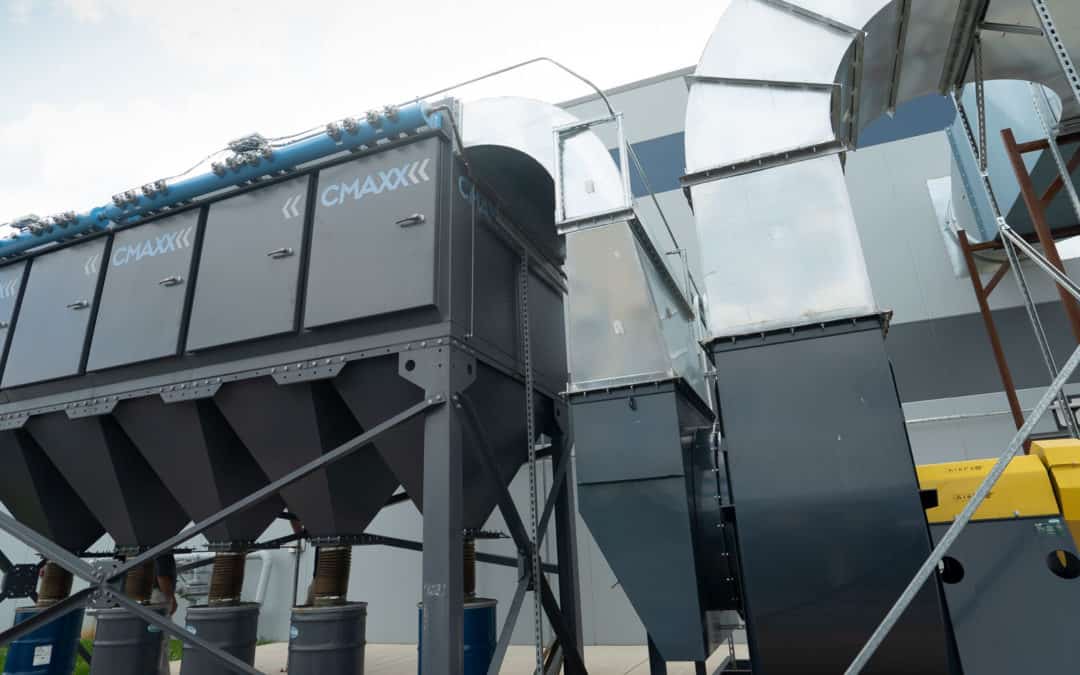
by Erin Long | Jun 26, 2019 | Plasma Cutting
At Fabtech in Chicago, Lee Adams of Leeco Solutions met representatives from a metal fabrication company in Cincinnati, OH who were struggling with their dust collection system. The company operates two robotic plasma cutting booths, cutting holes in ½ inch pipe. The dust collector seemed to be removing the fumes well enough, but there was a problem.
Short Dust Collector Filter Life
Running 8 hours per day, the filters in the dust collector needed replacing after only 80 hours of operation. Many manufacturers get six months to a year out of their filters before changing them. This company was spending enough on replacement filters to pay for a new dust collector.
Lee visited the facility and measured the airflow at each of the plasma cutting booths. He discovered that the system could capture the fumes. However, it failed to keep the filters clean, causing them to stop functioning.
Filter Cleaning Efficiency Required for Plasma Cutting Fumes
Lee examined the existing dust collector, a CMAXX competitor, a 12-cartridge collector with vertical filters and reverse pulse cleaning. He suggested replacing this collector with a 12-cartridge CMAXX for the plasma cutting operation.
Lee’s contact at the company was skeptical. He needed a guarantee that the new dust collector would give him 2000 hours of filter life. Lee knew the CMAXX could do the job.
CMAXX Replaces Failing Competitive Unit
The competitor’s collector was replaced with a CM012. The new dust collector worked as planned, easily handling the fumes from both plasma cutting booths.
Now, the next step was to wait. Would filters that used to last a week be able to give the company the 2000 hours of operation that Lee had guaranteed them?
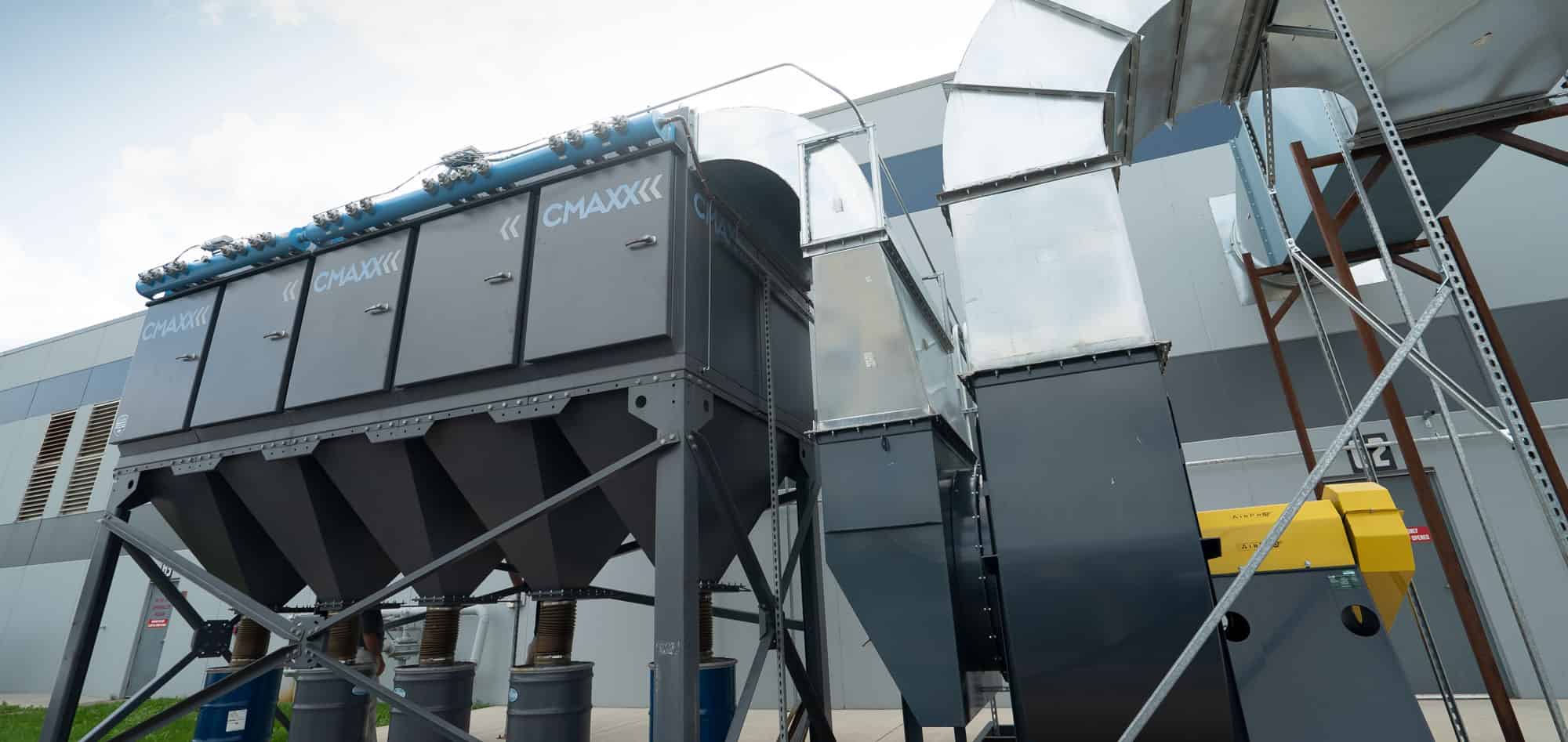
Success and Satisfaction for Plasma Cutting Booth Customer
The CMAXX system on the plasma cutting booths has currently been operating for an entire year. Lee’s contact at the company reports “It’s been running a year and is setting at 1.9″ WC. I’m going to get two years out of these filters!”
Instead of needing to be changed after a week, these filters are still going strong after a year. Differential pressure readings show that they’re not going to need changing any time soon.
This example proves that to solve a problem, you don’t always need a bigger dust collector. Sometimes you just need a better one. A superior product with a better cleaning system, the company’s new CMAXX left the competition in the dust.
Learn more about plasma cutting fume extraction.
Read our white paper on plasma cutting.
Read more



 GEAPS (Grain Elevator and Processing Society) 2019 in New Orleans featured some of the largest Grain and Seed processing equipment companies. This year at GEAPS was the first year that we decided to bring some rather large equipment. We really wanted to show up and show off some of our new technology. Our booth featured our new
GEAPS (Grain Elevator and Processing Society) 2019 in New Orleans featured some of the largest Grain and Seed processing equipment companies. This year at GEAPS was the first year that we decided to bring some rather large equipment. We really wanted to show up and show off some of our new technology. Our booth featured our new 



 What kind of dust collector upgrade might save your building or employees from serious harm? Some old dust collectors may not have the kind of fire and explosion prevention devices required by NFPA standards on newer equipment. In some cases, it may be a poor system design. In other cases, the company or the system designers may not have known the dust could be combustible.
What kind of dust collector upgrade might save your building or employees from serious harm? Some old dust collectors may not have the kind of fire and explosion prevention devices required by NFPA standards on newer equipment. In some cases, it may be a poor system design. In other cases, the company or the system designers may not have known the dust could be combustible.
